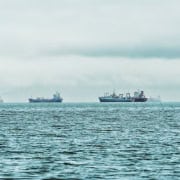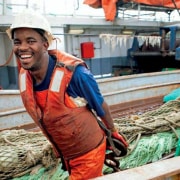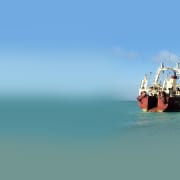|
Getting your Trinity Audio player ready...
|
Three years after the Fishrot scandal broke, none of those implicated have been held to account, nor has anything been done to plug the existing gaps in legislation which allowed Namibia’s biggest fishing scandal to flourish.
In a briefing paper released in November 2022, the Namibian Institute for Public Policy and Research (IPPR) says the Ministry of Fisheries and Marine Resources (MFMR) still operates under a veil of secrecy and is failing to make the necessary proposed legislative and policy changes that arose from Fishrot. The scandal revolved around the illegal allocation of fishing quotas to Icelandic fishing company Samherji, “in return for the payment of millions of dollars in bribes”.
“We don’t know who gets the quotas, even now,” said IPPR executive director Graham Hopwood during a recent conversation with Desert Radio in Windhoek. “The whole industry and the way it is run is mired in secrecy. We need a massive shift in attitude and mindset, but also in the laws and policies, to be able to monitor what’s happening in fisheries.”
Over the three-year period no major holistic reform of the system for awarding fishing rights and quotas has taken place in Namibia, despite commitments made under the Harambee Prosperity Plan II and proposed National Anti-Corruption Strategy and Action Plan (NACSAP) on aligning laws and practices with the Extractive Industries Transparency Initiative (EITI) standards on transparency.
“There is a lot of vested interest in fishing,” Hopwood said, commenting on the lag in taking concrete steps to rectify the situation, “and we know from the registers of members’ interests in the National Assembly that quite a lot of MPs have directorships or shareholding in fishing companies, so I don’t think there’s a great push for reform from within the government. They are benefiting from the current situation.”
South Africans, too, will recognise the same lack of political will – and motivation to keep the status quo – in their own government’s poor track record of making good on promises and implementing ambitious plans.
In terms of Harambee, Namibia should subscribe to the EITI standards. “and/or review applicable laws governing the extractive industries including Fisheries and Forestry to improve transparency and deepen public trust.”
Although the EITI standards apply mainly to the extractives industry, they have been used by at least one other country in relation to fishing. Mauritania announced in 2015 that it would include its fisheries in EITI implementation and as EITI promotes the understanding of natural resource management and how rights are awarded to applicants who wish to exploit those resources, there is no reason why its standards cannot be used in other industries which are built on the use of natural resources.
Furthermore, the NACSAP, says IPPR, “makes various commitments on improving transparency in the fisheries industry”. These improvements include aligning legislation with international standards; developing mechanisms for the transparent allocation of rights; and implementing anti-corruption policies and procedures in, among others, the fishing industry.
The Ministry of Fisheries and Marine Resources (MFMR) is the implementing agency for the NACSAP commitments while the Harambee plan falls under the auspices of the Anti-Corruption Commission.
Delayed action and reparation
In a joint statement issued on 13 November by IPPR and Transparency International Iceland (TI-IC), it is stated that the value of transactions which the Namibiam Financial Intelligence Centre flagged as suspicious amounts to some US$650-million (R11.2-billion). This gives Fishrot the unsavoury distinction of being “the largest corruption scandal in both Namibian and Icelandic history”.
Yet to date no implicated individual has been held to account. In fact, say IPPR and TI-IC, Samherji continues to operate “with apparent impunity while the communities affected by Fishrot have seen no meaningful compensation and the perpetrators have not yet faced justice”.
The effect of Fishrot on the country’s fishing industry, fishing communities, and economy in general has been devastating, say the two organisations. “Thousands of local fishermen are thought to have lost their jobs. The impact will undoubtedly be felt for generations.”
This is unacceptable, say IPPR and TI-IC, and much more must be done.
Exposing grand corruption
When former Samherji Namibia MD Jóhannes Stefánsson left the company in 2016, he took with him a cache of 30 000 documents and e-mail correspondence, which he handed over to WikiLeaks. The documents, now known as the Fishrot Files, were publicly available on Wikileaks but at the time of writing were not accessible.
In the Desert Radio conversation, Stefánsson said he was satisfied with the way the investigations and publicity around Fishrot are playing out in Namibia, and with the progress of that country’s justice system. “There are many channels for investigators and prosecutors. The media is playing a big role to keep the public informed, and this is important because investigators and prosecutors need that support. Without the media I don’t think we would have got this far.”
There is still a long road ahead, Stefánsson cautioned, with challenges to the Namibian accused’s bail applications in court, but the country has shown that it can take on a case of such importance and complexity, and with more and more information coming to the surface it is clear that investigators are doing good work to fully expose the corruption.
In terms of his safety, Stefánsson said it has become a way of living to be cautious, and he and his team take safety “very seriously”. By the time he reported the corruption in Samherji in August 2018, he said, he had already survived a few assassination attempts and was fully aware of what he was setting himself up for by blowing the whistle, because that risk would only increase.
This is the reality for whistle-blowers, especially those who expose grand corruption. In South Africa we remember Babita Deokaran, who was murdered to ensure her silence on procurement corruption, and Athol Williams, who was forced to leave the country for reasons of safety, and all the other brave whistle-blowers who knowingly put themselves in danger for the sake of doing the right thing.
Nevertheless, despite the risks, Stefánsson has committed to returning to Namibia to testify when the trial finally begins.
Journalists targeted
In Namibia, 10 suspects, including former justice minister Bernard Esau and former fisheries minister Sakeus “Sacky” Shanghala, will soon answer for their actions to a court of law. The country’s Anti-Corruption Commission has amassed enough evidence to proceed with the trial, said one of its investigators in October, and is confident of presenting a convincing prosecution case.
Meanwhile, in Iceland a lengthy investigation headed by a district prosecutor has yet to result in any formal charges being laid against the Icelandic suspects. And while the Namibian Prosecutor-General has brought charges against three senior Samherji executives in Iceland, no steps have been taken to extradite these individuals.
In a statement issued on 8 June, the IPPR said: “At present 10 suspects … have been arrested in Namibia and are awaiting trial in connection with the scandal while at least eight suspects are under investigation in Iceland.”
But instead of shining the spotlight on those who are implicated in wrongdoing, Icelandic police are said to be investigating journalists reporting on Samherji, according to Transparency International and TI-IC. This undermines press freedom and hampers anti-corruption efforts and is in no way in the public interest.
Call to action
In their joint statement, TI-IC and IPPR call for the fisheries sector to be much more transparent and open, and urge the MFMR to publish full details of rights holders, licence holders, and quota recipients – including beneficial ownership information.
The two organisations have laid out the steps which they would like to see unfolding:
- Samherji to submit to a process of reparation and remediation – to include:
- an assessment of the human rights and economic impact of Samherji’s Namibian activities;
- full reparation to affected communities;
- an operational grievance mechanism to address specific issues of local communities and individuals;
- Samherji’s international suppliers, customers, and business partners to review their arrangements with Samherji, in particular, in light of their increasing ESG (Environmental, Social and Governance) and ethical supply chain obligations and expectations;
- The Icelandic authorities to initiate criminal proceedings and take active steps to address corruption carried out by Icelandic citizens;
- the Namibian authorities to introduce further governance reform – particularly by urgently amending the Marine Resources Act (also known as the Esau Law), which enabled Fishrot – and to bring those responsible to trial as soon as possible, including applying to extradite the Icelandic suspects without further delay; and
- international governments, including the US, the UK, Germany, France, Poland, the Netherlands, Norway and the Faroe Islands, to take all available steps to ensure that proceeds of crime are not entering their economies through Samherji’s international investments made using proceeds of its Namibian business.
IPPR has gone a step further, calling for the amendment of the Marine Resources Act to include removal of the minister’s discretionary power.
“We still have the Marine Resources Act as it was amended in 2015, which allowed the then minister Bernard Esau almost unilateral and unchecked power to allocate quotas and fishing rights wherever he wanted … this was abused heavily to enable the Fishrot scandal,” said Hopwood.








